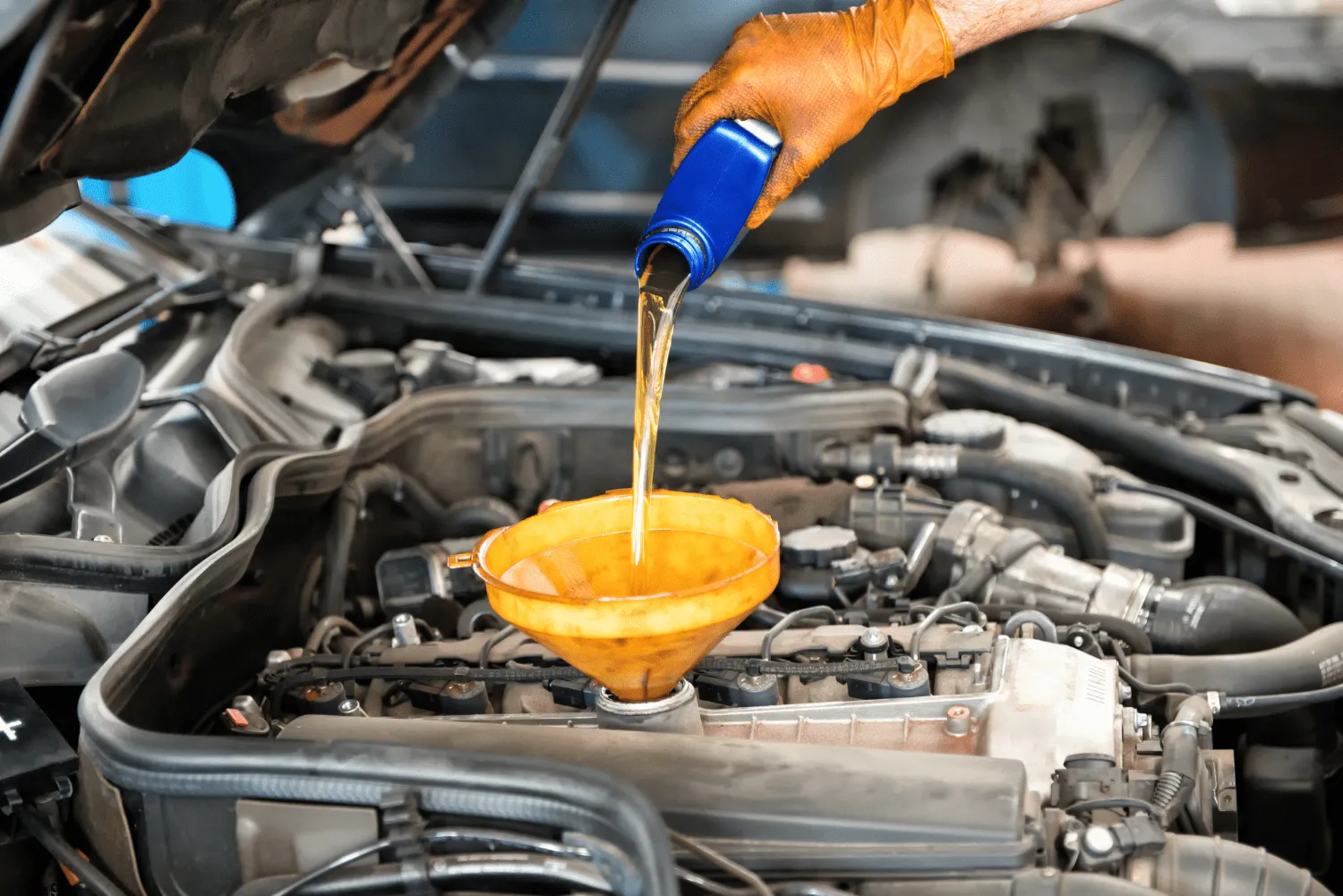Choosing the right diesel engine oil is more than an act of maintenance; it’s an investment in your vehicle’s longevity and optimum performance. This precious fluid plays an integral role in the safe and smooth operation of your engine, mitigating various issues that can occur due to friction, heat, and dirt.
This guide aims to shed light on the importance of diesel engine oil and provide strategic insights to help you make an informed decision when choosing the best oil for your engine.
Understanding the finer details of diesel engine oil, including its functionality and impact on your engine’s health, will empower you to protect your automobile from potential damage.
Understanding the Basics of Diesel Engine Oil
Diesel engine oil is a specially formulated lubricant designed to work with the unique mechanics of diesel engines. Its primary role is to create a thin, slippery layer between metal surfaces in your engine, reducing friction, minimizing wear and tear, and promoting smoother operations.
Diesel engine oils contain various additives that enhance their performance to contend with the high compression ratios and massive amounts of combustion byproducts associated with diesel engines.

Choosing the right diesel engine oil is crucial for your engine’s performance and lifespan. It’s responsible for enabling your engine to operate efficiently, extending its life, and safeguarding against damage. The type of engine oil you use directly influences the engine’s performance, gas mileage, and emissions output.
Failing to select the appropriate oil not only compromises these aspects but can also have severe consequences, including costly repairs or even complete engine failure.
AirTec High-Class Micro-Ceramic Oil Additive
HIGH -CLASS Micro-ceramic lubricating oil additive works with all conventional, semi- and fully synthetic engine and gear oils. It is a selected combination of the most modern high-tech solid ceramic lubricants, making it a world leader in ceramic additives.
shop nowThe Role of Diesel Engine Oil in an Engine’s Health
Diesel engine oil fulfills several critical roles that ensure the health and longevity of your engine. First, it provides lubrication, creating a protective layer that helps prevent metal-on-metal contact within the engine, reducing wear and prolonging fuel efficiency and the engine’s lifespan.
Second, engine oil aides in cooling. Internal combustion engines generate a significant amount of heat. The oil absorbs this heat, helping to regulate the engine’s temperature and prevent overheating—a key attribute considering the extreme temperatures of an overheated engine can cause serious damage, including outright failure.

Third, engine oil plays a major role in cleaning your engine. It contains detergents designed to keep your engine clean by neutralizing acids that originate from fuel and from oxidation of the lubricant, and by controlling the level of soot and preventing it from agglomerating. Hence, maintaining cleanliness and reducing the risk of sludge build-up that can interfere with engine performance.
Lastly, engine oil also seals your engine—well, to an extent. High-quality diesel engine oils can swell the components of the seal slightly, ensuring a tight fit and preventing leaks.
Diesel Engine Oil Classes and What They Mean
Understanding the classification system for diesel engine oils is integral in making an educated choice of best diesel oil for your engine. In the United States, the American Petroleum Institute (API) sets forth standards to classify different types of engine oil, typically designated with two letters, such as CJ-4 or CK-4. These classifications act as a benchmark, indicating the best engine oil’s performance, intended use, and compatibility with specific engine types.
CJ-4, for instance, was introduced in 2006 for high-speed, four-stroke engines designed to meet 2007 on-highway exhaust emission standards. This oil effectively controls oil consumption and wear and provides improved protection against diesel particulate filters (DPF) in the exhaust after-treatment devices compared to previous oil classes.
On the other hand, CK-4, the latest standard, provides superior performance and is meant to meet the demands of newer, more stringent engine conditions. This oil provides improvements in high-temperature oxidation stability, shear stability, aeration control, and resistance to viscosity loss through volatilization, among other benefits.
It’s crucial to choose an engine oil compatible with your engine’s design and the conditions under which it operates. Always refer to the engine manufacturer’s recommendations to ensure you’re using the right class of oil for diesel only.
Air-Tec HIGH-CLASS Automotive Oil Additive
The complex organic compounds found in HIGH-CLASS Automotive Oil Additive provide unmatched friction reduction and exceptional wear reduction and protection.
shop nowViscosity Ratings and Why They Matter
Viscosity is a measure of a fluid’s resistance to flow. It essentially dictates how quickly oil will move through your engine. The API characterizes motor oil’s viscosity and assigns it a rating, like 5W-30 or 10W-40. The number preceding the “W” (winter) indicates how well the very best motor oil performs in cold temperatures, whereas the number following the “W” represents the very best motor oil’s viscosity at high temperatures or operating temperature.

For example, a 5W-30 oil will flow better at low temperatures than a 10W-40 oil. At the same time, both provide the same viscosity at higher operating temperatures. These ratings are critical because your engine needs oil that is thin enough for cold starts, and thick enough when the engine is warm.
Selecting the right viscosity rating is dependent on various factors including engine type, operating conditions, and even climate. For colder climates, a lower “W” rating is preferred as the engine needs a less viscous oil for smoother starts. In general, always follow manufacturer’s viscosity grade recommendations when choosing an oil.
Synthetic Vs. Conventional Diesel Engine Oil
When it comes to choosing between a synthetic engine oil and conventional engine oils, understanding their unique advantages and disadvantages becomes vital.
Synthetic oils, as the name suggests, are artificially made. They provide higher levels of engine protection, especially under severe driving conditions, thanks to excellent high-temperature stability and fluidity at low temperatures. They also offer better protection against engine sludge and deposits, resulting in better fuel economy. However, synthetic oil tend to be more expensive than their conventional counterparts.

Conventional engine oils, on the other hand, are derived directly from crude oil. While they may not offer the same level of protection as synthetics, they come at a lower cost and are more than adequate for typical driving conditions.
Your selection between synthetic or conventional oil ultimately depends on your specific engine requirements, driving habits, and budget. While synthetics may be ideal for high-performance, high-stress driving or extreme weather conditions, conventional oils might suffice for lighter, everyday driving.
Above all, ensure to check your manufacturer’s oil recommendations to avoid jeopardizing the engine’s health and performance.
AirTec Frostline -40 Premium Diesel Antigel
AirTec Frostline -40 keeps your engine running smoothly all winter long! Mixing Ratios: 1 liter treats 100 gallons of diesel fuel, lowering the gelling temperature by more than 30 degrees Fahrenheit!
shop nowHow Driving Habits Can Influence Your Choice?
When choosing the right diesel engine oil, your driving habits and the conditions your vehicle operates under can play a considerable role. Various scenarios require different types and grades of diesel motor oil for your engine to perform optimally.
For instance, if you frequently drive in stop-and-go traffic or use your vehicle for short trips within the city, this kind of driving can cause more stress on your engine due to constant acceleration and deceleration. In such a case, you might be better off with oil that has excellent thermal stability and viscosity retention to deal with the heat buildup.
On the other hand, if you use your vehicle for heavy-duty operations, such as towing or carrying heavy loads, you may need engine oils that offer high resistance to shear-induced viscosity loss. These driving conditions exert more pressure on your engine, and engine oils for such use are formulated to withstand the additional strain.
Diesel engine oil selection is not a one-size-fits-all process. Your operational realities greatly influence the diesel oil type best suited for your engine’s health and performance.
The Importance of Considering Manufacturer’s Recommendations
Your vehicle’s manufacturer knows your engine best. When it comes to choosing engine oil, adhering to manufacturer’s recommendations is vital. These specifications take into account the intricacies of synthetic motor oil, your engine’s design, material composition, tolerances, and operational conditions, all of which are critical for correct oil selection.

Ignoring these recommendations can negatively impact your engine’s performance, wear rates, and even its lifespan. It can also potentially nullify your vehicle’s warranty. Most manufacturers’ warranties specify the use of certain grades and types of oil. By not adhering to these specifications, you risk voiding the warranty, which can be an expensive mistake in case of major engine problems.
Considering manufacturer’s recommendations also makes the process of engine oil selection relatively simpler and ensures you avoid common pitfalls associated with incorrect oil choice. In essence, it’s the least you can do to guarantee ideal engine performance and longevity.
How to Change Diesel Engine Oil?
Changing your diesel engine oil is relatively straightforward. Here’s a step-by-step guide on how to do it properly:
Gather necessary tools and materials. You’ll need new engine oil that matches your manufacturer’s recommendation, a new oil filter, an oil drain pan, an oil filter wrench, a set of wrenches or sockets, and some rags for cleanup.
Warm up the engine. Run your engine for a few minutes to warm up the oil, which makes it easier to drain.
Drain the old oil. Locate the oil drain plug beneath your vehicle and carefully remove it, allowing the old oil to flow into the drain pan. Once fully drained, replace the oil drain plug and tighten it appropriately.
Remove and replace the oil filter. Using an oil filter wrench, remove the old oil filter. Before installing the new filter, apply a bit of fresh oil onto the gasket at the top for a secure seal. Screw the new filter in place.
Add new oil. Locate the oil fill cap on top of the engine. Remove it and pour in the new oil using a funnel.
Check oil level. Start your engine and let it run for a few minutes, then turn it off. Use the dipstick to check the new oil level.
Dispose of old oil and cleanup. Old engine oil should be recycled. Your local auto parts stores often have oil recycling programs.
This process can save you money and give you a better understanding of your vehicle. Remember, always follow safety measures when performing maintenance on your vehicle.
Air-Tec HIGH CLASS Injector Cleaner
Air-Tec High Class Injector Cleaner cleans an engine’s fuel system, removing harmful oil, carbon, sludge, and resin build up. All Air-Tec High Class products are produced in Germany and held to the industry highest standards, ensuring our products meet and exceed your expectations.
shop nowConclusion
Choosing the right diesel engine oil is an art that marries technical knowledge, understanding of your driving conditions, and adherence to your manufacturer’s recommendations. With the numerous classifications, viscosity ratings, types of oil (synthetic versus conventional), and unique driving conditions, arriving at the best oil for your diesel engine requires careful consideration.
Furthermore, knowing when and how to change your diesel engine oil properly can boost your vehicle’s performance, prolong its life, and save you from unnecessary repairs.
Ultimately, the best diesel engine oil is one that matches your specific engine requirements and operational realities.
FAQs
What oil do most diesel engines use?
Most diesel engines use oil that meets specific API service classifications. These classifications (like CK-4 or CJ-4) indicate the oil’s performance and compatibility with certain engine types. The viscosity, denoted as 15W-40 or 5W-30, for synthetic diesel oil for example, should also be aligned with the vehicle owner’s manual and manufacturer guidelines.
Do I need special oil for a diesel?
Yes. Diesel engines operating under different conditions compared to their gasoline counterparts, which necessitates a unique formulation for diesel engine oils. These oils are designed to handle the higher soot levels in diesel oils, the presence of water and acid in the oil, and the more severe operational conditions in diesel engines.
Is 15W-40 oil only for diesel engines?
No, 15W-40 oil isn’t exclusive to diesel engines. While it is a common choice for many diesel engines due to its balance of flow properties and low-temperature performance, it is also used in gasoline and diesel engines, particularly gas engines used in warmer climates and high-load applications.
Do diesel engines take regular oil?
Not typically. Regular or conventional oils are often not formulated to deal with the unique demands of diesel engines. As such, heavy duty diesel engine-specific oils are needed to ensure proper lubrication and longevity of diesel engines.
Is 10W-40 oil only for diesel engines?
No, 10W-40 oil isn’t only for diesel engines. It’s a multi-grade oil suitable for both diesel and gasoline engines in passenger cars, light trucks, and other high-performance modern diesel engine vehicles that require fuel consumption from this specific grade motor oil.
Can I use any engine oil for a diesel?
No, you should not use just any engine oil for a diesel. Diesel engines require specific oils designed to handle the unique conditions they operate under. Always refer to the manufacturer’s guidelines to determine the appropriate diesel engine oil for your vehicle.










